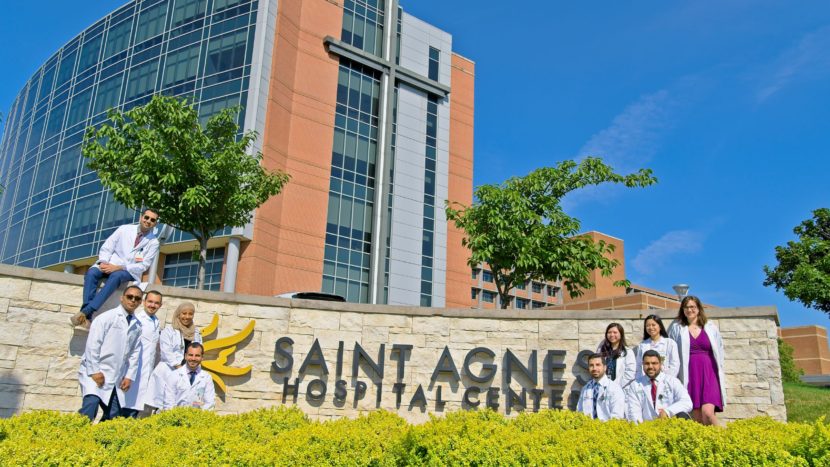Goals and Objectives
For Internal Medicine Residents
Our Mission
Our mission is to train superb physicians who are prepared for the clinical, academic and administrative challenges of practicing in the 21st century, no matter what path they choose, whether in primary care or subspecialty, in an academic center or office practice setting. We are committed to providing outstanding clinical training and personalized career mentoring in a stimulating intellectual environment focused on teamwork and excellent, safe patient care.
We achieve this mission by providing clinical experiences with an extremely diverse case mix of patients in a nurturing and supportive environment with a careful balance of progressive supervised autonomy. The diverse, dedicated faculty at Ascension Saint Agnes have a strong commitment to compassionate, patient centered care, teaching and academic excellence. Our residents strengthen our core mission everyday with their unique backgrounds, skills and goals and the program leadership strives for excellence in graduate medical education every day.
Goals and objectives
By the end of the program residents will:
- Be proficient in obtaining clinical data by patient interview, physical examination, and interpretation of laboratory data
- Be proficient in utilizing clinical data to prioritize problems and formulate differential diagnoses
- Formulate diagnostic and therapeutic plans demonstrating awareness of risks, benefits, costs, patient preferences, and ethical and psychosocial issues
- Utilize excellent communication skills with patients, families and other members of the health care team while demonstrating respect, compassion and integrity
- Demonstrate a commitment to ethical principles and to their professional responsibilities
- Read regularly, in texts and in the original literature, to achieve a broad knowledge base. They will keep abreast of the current literature and be able to translate the pertinent literature to clinical practice. Residents will be proficient in searching and critically analyzing the medical literature to answer clinical questions
Specific competencies as delineated by the American Board of Internal Medicine
Patient Care
Residents must be able to provide patient care that is compassionate, appropriate, and effective for the treatment of health problems and the promotion of health. Residents are expected to:
- Communicate effectively and demonstrate caring and respectful behaviors when interacting with patients and their families.
- Gather essential and accurate information about their patients.
- Make informed decisions about diagnostic and therapeutic interventions based on patient information and preferences, up-to-date scientific evidence, and clinical judgment.
- Develop and carry out patient management plans.
- Counsel and educate patients and their families.
- Use information technology to support patient care decisions and patient education.
- Perform competently all medical and invasive procedures considered essential for the area of practice.
- Provide health care services aimed at preventing health problems or maintaining health.
- Work with other health care professionals, including those from other disciplines, to provide patient-focused care.
Medical Knowledge
Residents must demonstrate knowledge about established and evolving biomedical, clinical, and cognate (e.g. epidemiological and social-behavioral) sciences and the application of this knowledge to patient care. Residents are expected to:
- Demonstrate an investigatory and analytic thinking approach to clinical situations.
- Know and apply the basic and clinically supportive sciences which are appropriate to their discipline.
Practice Based Learning and Improvement
Residents must be able to investigate and evaluate their patient care practices, appraise and assimilate scientific evidence, and improve their patient care practices. Residents are expected to:
- Analyze practice experience and perform practice-based improvement activities using a systematic methodology.
- Locate, appraise, and assimilate evidence from scientific studies related to their patients’ health problems.
- Obtain and use information about their own population of patients and the larger population from which their patients are drawn.
- Apply knowledge of study designs and statistical methods to the appraisal of clinical studies and other information on diagnostic and therapeutic effectiveness.
- Use information technology to manage information, access on-line medical information, and support their own education.
- Facilitate the learning of students and other health care professionals.
Interpersonal and Communications skills
Residents must be able to demonstrate interpersonal and communication skills that result in effective information exchange and teaming with patients, their patients’ families, and professional associates. Residents are expected to:
- Create and sustain a therapeutic and ethically sound relationship with patients.
- Use effective listening skills and elicit and provide information using effective nonverbal, explanatory, questioning, and writing skills.
- Work effectively with others as a member or leader of a health care team or other professional group.
Professionalism
Residents must demonstrate a commitment to carrying out professional responsibilities, adherence to ethical principles, and sensitivity to a diverse patient population. Residents are expected to:
- Demonstrate respect, compassion, and integrity; a responsiveness to the needs of patients and society that supersedes self-interest; accountability to patients, society, and the profession; and a commitment to excellence and on-going professional development.
- Demonstrate a commitment to ethical principles pertaining to provision or withholding of clinical care, confidentiality of patient information, informed consent, and business practices.
- Demonstrate sensitivity and responsiveness to patients’ culture, age, gender, and disabilities.
Systems-based Practice
Residents must demonstrate an awareness of and responsiveness to the larger context and system of health care and the ability to effectively call on system resources to provide care that is of optimal value. Residents are expected to:
- Understand how their patient care and other professional practices affect other health care professionals, the health care organization, and the larger society and how these elements of the system affect their own practice.
- Know how types of medical practice and delivery systems differ from one another, including methods of controlling health care costs and allocating resources.
- Practice cost-effective health care and resource allocation that does not compromise quality of care.
- Advocate for quality patient care and assist patients in dealing with system complexities.
- Know how to partner with health care managers and health care providers to assess, coordinate, and improve health care and know how these activities can affect system performance.

